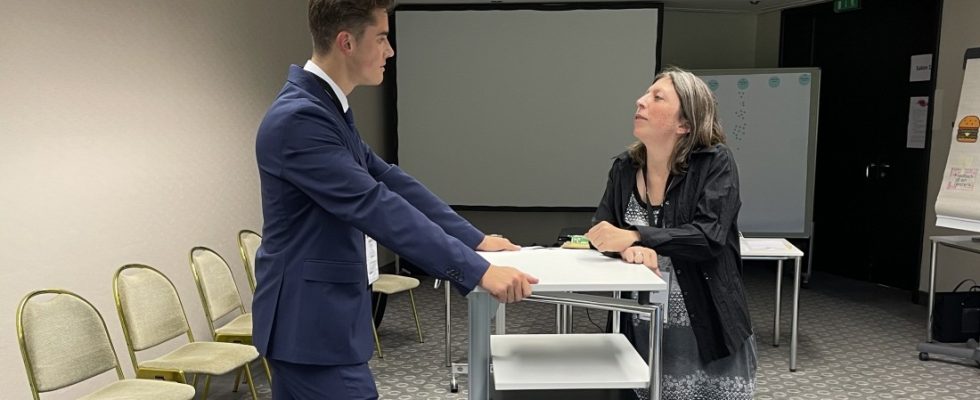Regina Kögler enters the bank branch and is warmly greeted by Sebastian Barth, a bank trainee. She wants to make a transfer. “How can I help you?” asks the trainee. But Regina Kögler suddenly stops responding. “Can you hear me, hello?” Barth asks again. He continues to talk to her, trying to get an answer. But no reaction. Then he lightly taps the customer on the shoulder and Kögler is back.
What Regina Kögler just acted can happen at any time in reality: Kögler is an epileptic and portrayed a so-called absence, a state of absence in which the person having a seizure does not fall over, but is not mentally present, as she says.
Sebastian Barth is one of around 80 bank trainees and 20 dual students from Hypo-Vereinsbank (HVB) who are taking part in the “Exercise Branch” project on this day. The setting is a group room in a hotel in Sonthofen im Allgäu, not a real branch. The project is a cooperation between HVB and Pfennigparade, a foundation that supports people with physical disabilities and other impairments and advocates for inclusion and social participation of people with disabilities.
The Pfennigparade arrived today with five people with disabilities who are going through case studies in workshops in which the trainees are “challenged,” explains inclusion manager Fabian Url. “The cases are not fictitious, but could also happen in reality. And that is It’s also very important to us that we act out realistic cases,” emphasizes Url. The people with disabilities themselves are in charge and they also lead the workshops. “People with disabilities are not perceived as deficient, but as experts,” says the inclusion manager. This is a great appreciation for people with disabilities because they occupy “a certain position of strength”. “We don’t want to talk about people with disabilities, but with them,” says Url.
Trainee Sebastian Barth was just able to try out how he would have acted in such a situation in a bank branch. “It was unusual and a bit overwhelming at first because I had never been in a situation like that before,” says the 19-year-old. Regina Kögler has words of praise: “The trainee reacted very well because he first asked several times, then he noticed that I was mentally absent, and then he continued to ask and then tapped me. And that’s how he got rid of me again taken out of the absence.”
In a practice branch set up in a hotel in Sonthofen, the other trainees observe the situations presented with people with disabilities and give feedback.
(Photo: Sophie Burkhart)
Fabian Url is inclusion manager at the Pfennigparade. He has prepared several scenarios that the bank apprentices have to play through.
(Photo: Sophie Burkhart)
The other trainees who observed the case also provide feedback. The light tapping is certainly criticized. Kögler advises always observing the situation carefully and considering whether touching is appropriate or not. Then there are questions from the plenary session, including very personal ones. “Are you living in fear of a seizure?” asks a trainee. She can understand the question well, says Kögler. “You don’t have a choice, so you adapt. But the more people know that such seizures can happen, the safer we epileptics feel,” she explains, because you can’t recognize your disability at first glance.
Kögler’s case is just one of several scenarios that the Pfennigparade has prepared. “We also have someone with us who is difficult to understand because of his disability. He speaks very quickly and, especially when he comes into a new situation, the words come over him,” reports inclusion manager Fabian Url. It is then important to stay calm, ask and also offer the person to write down the transfer amount, for example.
The 80 trainees taking part in the project are still in their first week of training. “The topic is extremely important for us because the word inclusion is not just an empty phrase, but we really have a deep conviction and want to pass on this attitude to our employees from day one,” explains Jens Fölting from HVB’s talent acquisition department. The practice branches create concrete meeting spaces and eliminate fears of contact. “The desire is to create an experience that is totally emotional and special and that people won’t forget so quickly,” says Fölting. The feedback from trainees over the past few years has always been very positive. The project has been running since 2016. Trainee Barth is also satisfied: “The feedback was great. At first I thought there might have been mistakes, but it was very positive. I can go to the branch on Monday with confidence.”

